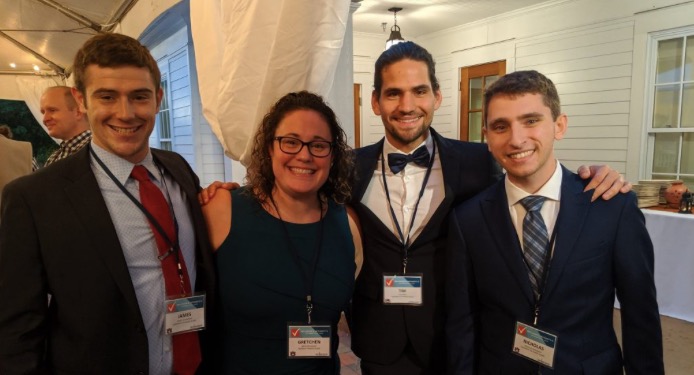URI Votes participants (left to right) James Houghton, Gretchen Macht, Tim Jonas, and Nicholas Bernardo, received a research grant for the coming elections.
The University of Rhode Island Voter OperaTions and Election Systems (VOTES) project recently received three grants totaling $700,000 to research how COVID-19 will affect the upcoming election.
The program, led by assistant professor of mechanical, industrial and systems engineering Gretchen Macht, has been studying ways to optimize both voting and physical polling places since 2017.
For the past few months, URI VOTES has used their studies of optimization to calculate how to keep voters and poll workers as safe as possible this November. They primarily do this through studies of how many people can be in polling locations at the same time, how quickly they can move through a room and how voting equipment can be handled in a safe manner. Macht said that they’ve helped the Rhode Island Board of Elections, as well as counties and states across the country, implement these practices.
URI VOTES is also partnering with similar programs at Auburn University and the University of Nebraska-Lincoln. Macht said that she speaks with Auburn political science professor Bridgett King and Nebraska architectural engineering professor Jennifer Lather on a daily basis.
Much of the funding that URI VOTES received is going towards supporting the students involved, although Macht said that this wasn’t the only purpose.
“We have five graduate students on the project, we have nine undergraduates on the project, so a huge proportion [of the grant is] supporting that,” Macht said. “Other parts of it are supporting our collaborators at Auburn and Nebraska. It is also supporting computational power and the availability of the software and the hardware to do the things that we need.”
Despite all of the problems caused by the coronavirus pandemic, Nicholas Bernardo, a graduate student working on URI VOTES, said the crux of the program is still the same.
“The real difference with COVID is just another level of the same concept that we were going for before,” Bernardo said. “If we’re implementing COVID strategies or we need to control occupancy, how does that change system flow, system performance or how do we best implement those different practices to make sure people are safe?”
COVID-19 has changed some aspects of what URI VOTES studies, however. This includes polling people that are more likely to vote early or by using an absentee ballot.
“You do have shifts in behavior that are occurring, if you look at some of the most recent polls, about 50 percent of the public has decided that they will do in-person voting, whereas if you asked them earlier on this summer, the proportion was much higher,” Macht said.
This is a significant shift from earlier in the summer, according to Macht, when higher numbers of people planned on voting absentee. Different laws regarding absentee voting in different states change people’s choices more in some places than in others.
“It makes the math fun, for sure, but challenging nonetheless,” Macht said.
Ultimately, it’s too early to gauge the full impact of absentee voting and early voting on the election, according to the research team.
“It’s difficult at this time with the limited historical data on early voting and widespread absentee voting,” Bernardo said. “The effect is going to be much more apparent after the upcoming elections and the early voting periods.”

